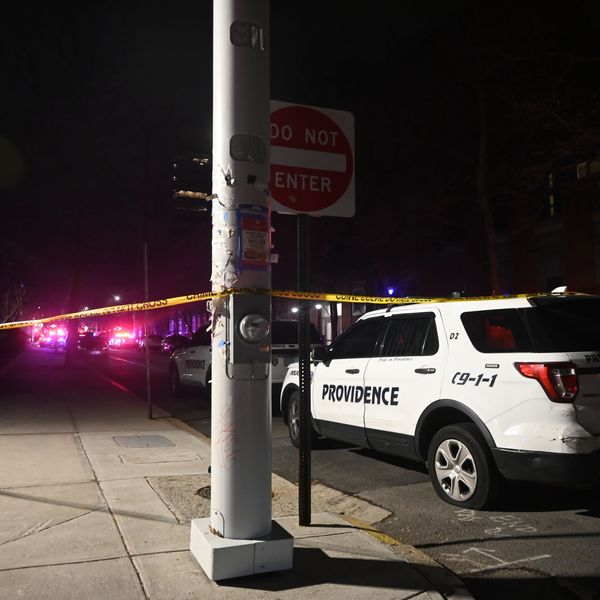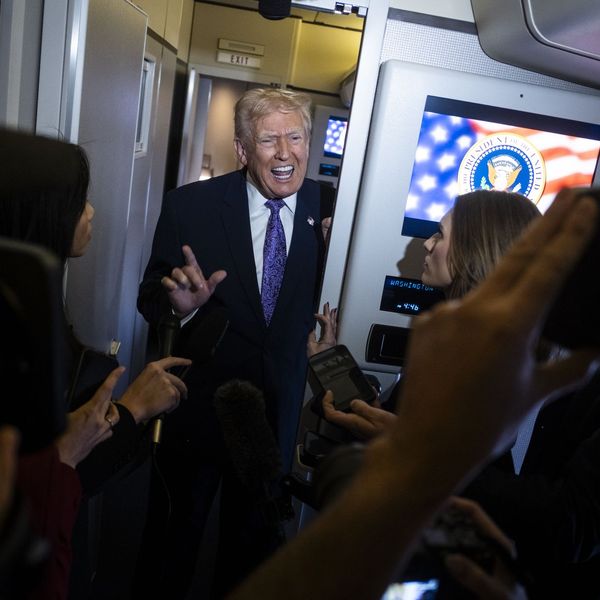The Texas Shooting Should Not Distort Our View of Free Speech
Our knee-jerk defence of offensiveness, be it over the Dallas attacks or the Charlie Hebdo murders, overlooks the bravery of those who are truly questioning power
The gun attack in Dallas, Texas, at a contest to draw cartoons of the Prophet Muhammad, evokes memories of the January shootings at the Paris office of the satirical magazine Charlie Hebdo.
Two gunmen were killed and a security guard injured at the Muhammad Art Exhibit, organised this weekend by the American Freedom Defense Initiative. Coincidentally, the French magazine will pick up a Freedom of Expression Courage honour in New York tomorrow, awarded by the literary group PEN. When six writers pulled out of the ceremony in protest, Salman Rushdie accused them of cowardice and condoning terrorism. The six argue that the award validates "selectively offensive" racist and anti-Islamic material. All parties rightly agree that no one anywhere should be threatened or harmed for what they write or draw.
But are all victims of this contemptible violence automatically courageous? To insist that this is so, as PEN appears to be doing in honouring Charlie Hebdo for "soldiering on", paradoxically allows the actions of the criminally violent, whatever cause they claim, to determine what constitutes brave and significant speech. Are Draw the Prophet contests - organised in this instance by the virulent anti-Islamic campaigner Pamela Geller and attended by the far-right Dutch politician Geert Wilders - really the sort of thing for which we defend the hard-won right to speak difficult truths?
The time has come for a more challenging conversation about what makes for the really courageous and truly oppositional. Outcries about free speech that revolve solely around western controversialists and unhinged gunmen declaring insult threaten to narrow our understanding of its value; we are in danger of thinking of all offending speech as brave speech. Without giving quarter to violence even against pubescent graffiti, we must ask what sorts of speech make the defence of freedom of expression truly worthwhile.
Free speech is most precious when it genuinely questions power, when dissent challenges and undermines an unacceptable status quo. Meaningful dissent makes the invisible visible. While the openly tyrannical are obvious targets, in formally democratic contexts free speech is truly only a weapon when it sets its sights upon insidious norms and received ideas rather than sanctioned enemies. Charlie Hebdo is frequently described as satire against the powerful, but power is always context-specific. What is the oppositional value of caricaturing religion in a formally secular nation, particularly if the targeted faith is that of a demonised minority who are often pilloried as enemies of the state anyway?
By contrast, it was breathtakingly brave of the Saudi blogger Raif Badawi to criticise a vicious religious-political regime. Publicly flogged and still in jail, Badawi continues to pay a heavy price. Meanwhile the governments of "free" western countries continue to parley with Saudi autocrats.
Read the full article at the Guardian.
An Urgent Message From Our Co-Founder
Dear Common Dreams reader, The U.S. is on a fast track to authoritarianism like nothing I've ever seen. Meanwhile, corporate news outlets are utterly capitulating to Trump, twisting their coverage to avoid drawing his ire while lining up to stuff cash in his pockets. That's why I believe that Common Dreams is doing the best and most consequential reporting that we've ever done. Our small but mighty team is a progressive reporting powerhouse, covering the news every day that the corporate media never will. Our mission has always been simple: To inform. To inspire. And to ignite change for the common good. Now here's the key piece that I want all our readers to understand: None of this would be possible without your financial support. That's not just some fundraising cliche. It's the absolute and literal truth. We don't accept corporate advertising and never will. We don't have a paywall because we don't think people should be blocked from critical news based on their ability to pay. Everything we do is funded by the donations of readers like you. Will you donate now to help power the nonprofit, independent reporting of Common Dreams? Thank you for being a vital member of our community. Together, we can keep independent journalism alive when it’s needed most. - Craig Brown, Co-founder |
The gun attack in Dallas, Texas, at a contest to draw cartoons of the Prophet Muhammad, evokes memories of the January shootings at the Paris office of the satirical magazine Charlie Hebdo.
Two gunmen were killed and a security guard injured at the Muhammad Art Exhibit, organised this weekend by the American Freedom Defense Initiative. Coincidentally, the French magazine will pick up a Freedom of Expression Courage honour in New York tomorrow, awarded by the literary group PEN. When six writers pulled out of the ceremony in protest, Salman Rushdie accused them of cowardice and condoning terrorism. The six argue that the award validates "selectively offensive" racist and anti-Islamic material. All parties rightly agree that no one anywhere should be threatened or harmed for what they write or draw.
But are all victims of this contemptible violence automatically courageous? To insist that this is so, as PEN appears to be doing in honouring Charlie Hebdo for "soldiering on", paradoxically allows the actions of the criminally violent, whatever cause they claim, to determine what constitutes brave and significant speech. Are Draw the Prophet contests - organised in this instance by the virulent anti-Islamic campaigner Pamela Geller and attended by the far-right Dutch politician Geert Wilders - really the sort of thing for which we defend the hard-won right to speak difficult truths?
The time has come for a more challenging conversation about what makes for the really courageous and truly oppositional. Outcries about free speech that revolve solely around western controversialists and unhinged gunmen declaring insult threaten to narrow our understanding of its value; we are in danger of thinking of all offending speech as brave speech. Without giving quarter to violence even against pubescent graffiti, we must ask what sorts of speech make the defence of freedom of expression truly worthwhile.
Free speech is most precious when it genuinely questions power, when dissent challenges and undermines an unacceptable status quo. Meaningful dissent makes the invisible visible. While the openly tyrannical are obvious targets, in formally democratic contexts free speech is truly only a weapon when it sets its sights upon insidious norms and received ideas rather than sanctioned enemies. Charlie Hebdo is frequently described as satire against the powerful, but power is always context-specific. What is the oppositional value of caricaturing religion in a formally secular nation, particularly if the targeted faith is that of a demonised minority who are often pilloried as enemies of the state anyway?
By contrast, it was breathtakingly brave of the Saudi blogger Raif Badawi to criticise a vicious religious-political regime. Publicly flogged and still in jail, Badawi continues to pay a heavy price. Meanwhile the governments of "free" western countries continue to parley with Saudi autocrats.
Read the full article at the Guardian.
The gun attack in Dallas, Texas, at a contest to draw cartoons of the Prophet Muhammad, evokes memories of the January shootings at the Paris office of the satirical magazine Charlie Hebdo.
Two gunmen were killed and a security guard injured at the Muhammad Art Exhibit, organised this weekend by the American Freedom Defense Initiative. Coincidentally, the French magazine will pick up a Freedom of Expression Courage honour in New York tomorrow, awarded by the literary group PEN. When six writers pulled out of the ceremony in protest, Salman Rushdie accused them of cowardice and condoning terrorism. The six argue that the award validates "selectively offensive" racist and anti-Islamic material. All parties rightly agree that no one anywhere should be threatened or harmed for what they write or draw.
But are all victims of this contemptible violence automatically courageous? To insist that this is so, as PEN appears to be doing in honouring Charlie Hebdo for "soldiering on", paradoxically allows the actions of the criminally violent, whatever cause they claim, to determine what constitutes brave and significant speech. Are Draw the Prophet contests - organised in this instance by the virulent anti-Islamic campaigner Pamela Geller and attended by the far-right Dutch politician Geert Wilders - really the sort of thing for which we defend the hard-won right to speak difficult truths?
The time has come for a more challenging conversation about what makes for the really courageous and truly oppositional. Outcries about free speech that revolve solely around western controversialists and unhinged gunmen declaring insult threaten to narrow our understanding of its value; we are in danger of thinking of all offending speech as brave speech. Without giving quarter to violence even against pubescent graffiti, we must ask what sorts of speech make the defence of freedom of expression truly worthwhile.
Free speech is most precious when it genuinely questions power, when dissent challenges and undermines an unacceptable status quo. Meaningful dissent makes the invisible visible. While the openly tyrannical are obvious targets, in formally democratic contexts free speech is truly only a weapon when it sets its sights upon insidious norms and received ideas rather than sanctioned enemies. Charlie Hebdo is frequently described as satire against the powerful, but power is always context-specific. What is the oppositional value of caricaturing religion in a formally secular nation, particularly if the targeted faith is that of a demonised minority who are often pilloried as enemies of the state anyway?
By contrast, it was breathtakingly brave of the Saudi blogger Raif Badawi to criticise a vicious religious-political regime. Publicly flogged and still in jail, Badawi continues to pay a heavy price. Meanwhile the governments of "free" western countries continue to parley with Saudi autocrats.
Read the full article at the Guardian.

